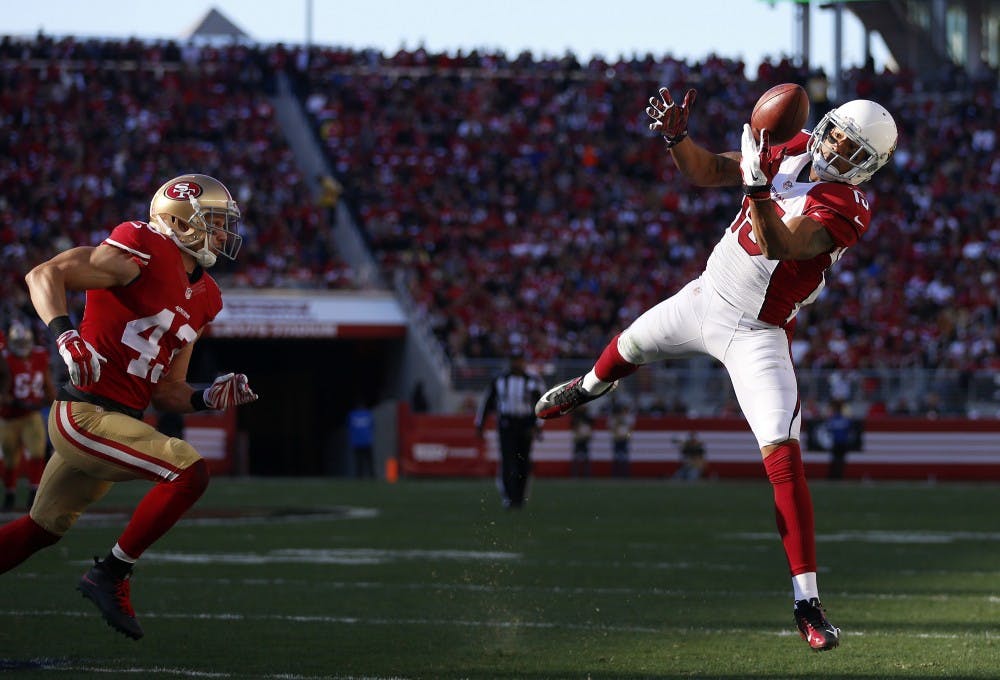In the United States alone, 17.6 million people suffer from alcohol addiction, according to the National Council on Alcoholism and Drug Dependence.
Alcoholism hurts the lives of everyone from blue-collar workers to millionaire athletes. One in every 12 adults suffers from alcoholism, yet this disease is still misunderstood and mistreated for many, even on the most prominent level.
Last month, then-Arizona Cardinals wide receiver Michael Floyd was found asleep at the wheel hours after a close loss to the Miami Dolphins.
The police found him just before 3 a.m. in Scottsdale. Floyd’s blood-alcohol level was 0.217 percent, a level which is considered a super extreme DUI in Arizona. Two days after the DUI, Floyd was cut from the Cardinals — only to be picked up by the Patriots about a week later.
As a student at Notre Dame, Floyd had a similar incident: In 2011, he was suspended indefinitely for driving drunk with a blood alcohol level twice the legal limit.
Ultimately, his suspension was lifted and he was picked up by the Cardinals in the first round of the 2012 NFL Draft. These two cases make it pretty clear that Floyd has been dealing with alcoholism for a number of years and needs help.
Despite the worldwide stigma that alcoholism isn't a real disease, the American Medical Association recognizes it as an illness.
“If Michael Floyd had cancer, the Arizona Cardinals would have been working to find the best possible care or treatment available,” said Mike Fitzpatrick, a Phoenix-area treatment center owner and recovery advocate. “Because he has alcoholism, he lost his job. Perhaps the league and the team could do more to educate the players and help them have a better understanding of the illness of alcoholism and what treatment options are available.”
Alcoholism in the United States is widely misunderstood. It is one of the only illnesses where the people suffering from the disease are blamed when treatment doesn’t work for them.
While many people see Floyd’s reckless behavior deserving of the consequences, Fitzpatrick sees it differently.
“I look at [his behavior] and to me it validates the fact that this guy is sick, his alcoholism has progressed and that he needs serious help before he kills himself or someone else,” Fitzpatrick said.
The Patriots are about to play in the AFC Championship game, one win away from getting to the Super Bowl, and Floyd is getting quality playing time.
The fact that Floyd was picked up by a team regarded as a Super Bowl favorite only a week after his DUI incident is potentially troublesome.
It doesn’t seem like the Patriots are too concerned with getting Floyd the help he needs, and being in such a positive situation so fast after this may make him think that this really wasn’t that big of a deal.
Brain injuries, which are common among football athletes, complicate drug and alcohol addiction. According to The Fix and an Outside the Lines report, brain trauma can cause addiction to drugs.
Athletes who suffer from Chronic Traumatic Encephalopathy (CTE) or a high number of concussions are often more prone to drug and alcohol abuse.
One way that many of these athletes become addicted is from self-medicating — often because of extreme headaches — and they don’t have the impulse control to properly treat themselves.
Without further analyzing his brain there is no way to know if Floyd suffers from alcoholism because of concussions, but it is safe to bet that this problem is at least in some way related to football.
The NFL needs to have a policy in place that requires athletes suffering from alcoholism to get the treatment they need.
The league must help these athletes overcome their disease just as if it was any other illness, especially since it profits on the very thing that may makes its players addicted.
Reach the columnist at kmarlin1@asu.edu or follow @kynan_marlin on Twitter.
Editor’s note: The opinions presented in this column are the author’s and do not imply any endorsement from The State Press or its editors.
Want to join the conversation? Send an email to opiniondesk.statepress@gmail.com. Keep letters under 300 words and be sure to include your university affiliation. Anonymity will not be granted.
Like The State Press on Facebook and follow @statepress on Twitter.




